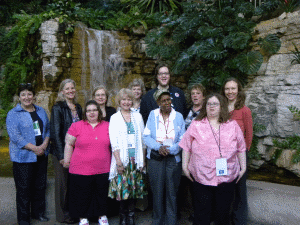Rachael Sarto, MN LEND Trainee, Attends Allies in Self Advocacy Summit
May 3, 2011

|
| Members of the Minnesota State Team |
Like many people in this field, my commitment to justice for people with developmental disabilities started early. At age five, two adult friends of mine with Down syndrome explained to me why they had just gotten married after loving each other for many years: People didn't want to let them marry. I was outraged for my generous and loving friends. As years passed, my experiences continued to persuade me that people who think or function differently add richness to my life and to any community.
This summer, I will complete a masters degree in the School of Social Work at the University of Minnesota. I have had the privilege this year of participating as a trainee in the University of Minnesota LEND (Leadership Education in Neurodevelopmental Disabilities) program. Before beginning graduate school, I worked for several years as a direct support professional (DSP), supporting adults with intellectual and developmental disabilities to live in their own apartments and engage with their communities. Every time I heard a presentation or discussion about self-advocacy, my ears perked up. In graduate school, I began exploring the academic research into what makes a good ally or advisor for self-advocacy groups. I also talked with Rick Cardenas and Mary Kay Kennedy of Advocating Change Together, a self-advocacy organization based in the Twin Cities. Mary Kay had good advice for me, "Yes, you're welcome to join us. Come get involved!"
I'm just beginning to learn about the self-advocacy movement, but the Minnesota team invited to the Administration on Developmental Disabilities (ADD) Summit on Allies in Self Advocacy in Kansas City, MO this April generously allowed me to join them at the Summit as a learner. The Summit was an interesting mix of self-advocates and professional leaders in the field of developmental disabilities - researchers, state agency heads, DD Council leaders. A few people were allies or advisors active in supporting self-advocacy. The states represented were Missouri, Kansas, South Dakota, Oklahoma, Arkansas, and Minnesota.
Each team shared current self-advocacy activities with the whole group, and we heard from the new ADD Commissioner, Sharon Lewis. Later we divided up and met with just the team members from our state. Our goal was to make some plans about self-advocacy next steps at the state level. Unfortunately, our meeting didn't go very well. We all knew our goal was to listen to the self-advocates first and foremost, but with an hour and a half to come up with shared strategies, it was obvious that everyone but the self-advocates was talking. And this is a group of people passionate about supporting self-advocacy! Many of our team members have led the way in improving conditions for people with developmental disabilities in Minnesota for many decades. But in that meeting format, we all watched as the self-advocates in the room went quiet. By the time we all knew what had happened, we had a general plan to develop a task force around funding for self-advocacy in our state - and the meeting was over.
I wish that meeting had gone differently, but seeing it happen was profoundly educational. Even more educational for me was the response of the self-advocates from our team the next morning. They spoke out to the whole Summit about being left out of the conversation, and sang a song about it. We all knew we wanted our next Minnesota team meeting, about national recommendations, to be different.
Here is how it was different: Tia Nelis, another LEND trainee from Illinois and a longtime leader in the self-advocacy movement, facilitated the conversation and laid down shared agreements about the value of everyone asking anytime we didn't understand something. She asked the self-advocates to speak first, and we were all ready to listen. A much slower process unfolded, with allies contributing, but self-advocates active and central. Even though the process seemed slower, we had more to share with the Summit at the end.
Although it's not a hard idea to grasp intellectually, these experiences brought something home to me. That was that if we actually want to support and promote the leadership of people with intellectual and developmental disabilities in the movement for their own justice, we probably have to do the processes of discussion and decision-making differently. Access needs to be ensured through the words we use and the types of learning and expression that are available and valued. The process might need to slow down. Our second meeting reminded me of the principle of universal design, in that it was set up to be accessible for the self-advocates, but then seemed to go better for all of us. I still have a lot to learn about what works and what doesn't. I look forward to learning more about this from more experienced allies and from self-advocates in the years ahead.
To learn more about the Self-Advocacy Summits, visit http://alliesinselfadvocacy.org/







